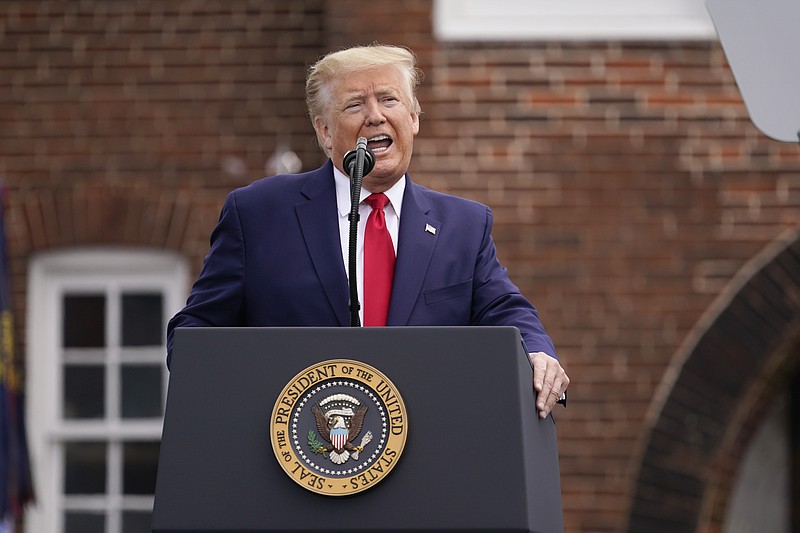On Jan. 20, 2017, in his presidential inaugural address, Donald Trump foresaw a new era of economic nationalism.
"For many decades," he said, "we've enriched foreign industry at the expense of American industry. ... We've made other countries rich while the wealth, strength and confidence of our country has disappeared over the horizon. One by one the factories shuttered and left our shores, with not even a thought about the millions upon millions of American workers left behind. The wealth of our middle class has been ripped from their homes and then redistributed across the entire world.
"But that is the past. ... From this day forward, a new vision will govern our land. From this moment on, it's going to be America First."
Trump went on to talk about future decisions in trade being made to benefit American workers and families and about protecting the U.S. from "other countries making our products, stealing our companies and destroying our jobs."
"Protection," he said, "will lead to great prosperity and strength. ... We will follow two simple rules: Buy American and Hire American. ... At the bedrock of our politics will be a total allegiance to the United States of America, and through our loyalty to our country, we will rediscover our loyalty to each other."
Not surprisingly, given the hate already being heaped on Trump because of his upset win, national media panned the speech as xenophobic, "angry," "grim" and "fierce."
More than three years later, up to 94% of American voters in a survey by FTI Consulting say they're willing to support aspects of an economic nationalist overhaul of the U.S. economy in the wake of the coronavirus pandemic that many believe spread because of poor policies in China.
Since the North American Free Trade Agreement was signed in 1993 and China became a part of the World Trade Organization in 2001, 5 million American manufacturing jobs have been eliminated from the U.S. economy - 3.4 million due to U.S. free trade with China - and 50,000 manufacturing plants have closed. In turn, the U.S. has seen a more than 600% increase in its trade deficit.
This is the trend Trump wanted to change, though neither he nor anyone could have predicted the virus's role in it.
The highest number in the FTI survey - 94% - came from those who say labels should be required on products that indicate all the countries where the product was designed, manufactured, and assembled, and indicate what percentage of the product was made in each country.
Ahead of the survey, an online petition asking the Trump administration to require country-of-origin labeling for beef, pork, and dairy products has found support. And bipartisan legislation has been introduced by Sens. Rick Scott, R-Florida, and Tammy Baldwin, D-Wisconsin, to require products sold online to disclose where they are made and manufactured.
The FTI poll also found 88 percent of Americans support a requirement that medical supplies be made in the U.S. and from 81% to 87% back requirements for pharmaceuticals, products bought by the Defense Department, airplanes, and airplane parts be made here.
The problems have been amplified during the pandemic because so many medical necessities are made in China, where the virus is thought to have originated and which implemented the first shutdowns in order to slow its spread.
Around 95% of ibuprofen and 70% of acetaminophen imported to the U.S. come from China, for instance, as does a plurality of the other drugs, rubber gloves and plastic bottles we receive.
It is easy to say the country simply needs to return manufacturing here, though, but it is not easy or simple. Manufacturing left the U.S. because it was too expensive to make goods stateside. Whether the blame was because of corporate profits, union benefits or a myriad of other reasons, it was cheaper for goods to be made elsewhere and imported here.
The question, then, becomes what Americans are willing to do to have manufacturing return to these shores.
According to the FTI survey, 76% of respondents say they are willing to pay between 5% and 100% more for U.S.-made products. But would they?
About four in 10 Americans in the survey say they will not buy products imported from China. And of the 60% who say they'll still buy Chinese-made products, 34% - this made us laugh - said they don't like the fact the items are made in China.
In addition, 66% in the survey say they want more tariffs on foreign imports, which amounts to increasing the price because the exporters of the goods are not about to absorb the cost of tariffs themselves.
When a COVID-19 vaccine is perfected, will Americans demanding that the manufacture of goods return home still be saying that or will the desire for the latest iPhone to be assembled as fast and as cheaply as possible carry the day? The answers to questions like that may determine who dominates the global economy for the remainder of the 21st century.
